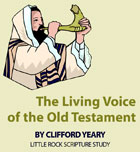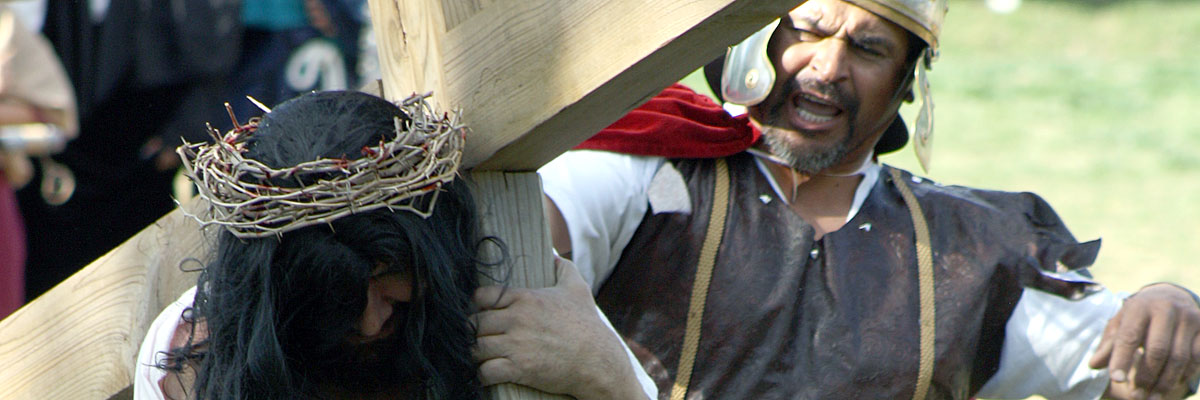Official Website of the
Catholic Diocese of Little Rock
Genesis answers our questions of faith
Published: September 19, 2009
This is the second column in a six-part series
By Clifford M. Yeary
Associate Director, Little Rock Scripture Study
Today, influenced by the fascinating discoveries of science concerning the vast age of the earth and the universe as a whole, much of what we presume Genesis tells us about creation seems to be called into question. When we read Genesis 1, our questions often turn around what it says about the age of creation and whether evolution can in any way be compatible with how Genesis describes the manner of our creation. Genesis 1–2:4a actually attempts to answer religious questions, not scientific questions, and the answers it gives are as relevant as ever.
 We need to appreciate that this account of creation was inspired by God to help us know who it is that created us and why it is that we have been given such awesome responsibilities in the world in which we live.
We need to appreciate that this account of creation was inspired by God to help us know who it is that created us and why it is that we have been given such awesome responsibilities in the world in which we live.
It was not given to us to answer our scientific curiosity. Instead, it is a timeless declaration of the wisdom God employed in creating the world and our substantial role as the “image of God” in furthering God’s creative interest in the world (Genesis 1:27). Catholic scholars inform us that Genesis 1 was intended to answer the deep and significant questions of a people who lived at a very fragile time in history.
Civilization itself seemed threatened by both natural and manmade forces. While the story itself may have had a long past with deep roots in oral tradition, it was written down and proclaimed in its present form in order to reassure and challenge God’s people at a much later time. God’s people feared the chaos of flood, famine, pestilence and drought. They had experienced a war that destroyed their homeland and sent them into slavery in Babylon.
Genesis told them that the forces of chaos that had so disrupted the world around them were still no match for God’s creative power. In the beginning, the world itself had once been “a formless wasteland” with only “darkness” to cover the “abyss” (Genesis 1:2). But as God spoke to creation, it became radically transformed. As part of God’s binding covenant with Israel, this creation account assured a fearful, weary people that listening and responding with faith to God’s word would once again bring order and dignity to their chaotic lives.
We are asked to read it with the same faith today, for God’s word never fails to bring light out of darkness, order out of chaos. The poetic framing of God’s creative power within the context of a week’s work dramatically emphasizes the power and order and goodness responding to God’s word can yet bring to human affairs if we will listen to God’s word. In each of the first three “days,” the wise Creator calls into being an appropriate home for everything that is yet to come. On the subsequent three days all things of creation that require a home to dwell in will find their proper habitation.
On day one God creates night and day. These are not merely times of day, but carefully planned homes for the stars and moon and for the sun. But these lights are not put there until day four, because places come first, then the things that dwell there. And so, the separated domes of sea and sky of day two will become the homes for sea creatures and birds on day five. The dry land and its plants of day three will be the nurturing home of every animal and humans on day six.
God has wisely ordered creation so that there is a place for everything and everything is found in its appropriate place. This is God’s doing, and it is done by the power of God’s word, the same word that seeks to provide order and dignity to human affairs, if we will but listen.
As the “image of God,” we have a responsibility to God in our human labors. We are to reveal God’s creative interest in the world, to be representatives of a loving, caring God, called to further God’s abiding interest in bringing order out of disorder and shedding light within darkness.
In our world, chaos may threaten, but it never has the last word, for that always belongs to God. If the world was ruled by chaos, it would be an evil world, with no good in it for anyone or anything. But our world was created by a wise God, against whom chaos has no power. God speaks, chaos is quelled, and order and purpose are revealed. That is the heart of the message of Genesis 1.
Study Questions
1. What were the places the author of the article says God created on days 1, 2 and 3? What did God create to put in each of those places on days 4, 5 and 6?
2. What are some religious questions about God and creation that Genesis 1:1–2:4a helps answer for you? What are some questions about the origins of the world and life in it that science has helped answer for you?
3. What in creation or about creation most leads you to an awareness of God as creator?
This article was originally published in Arkansas Catholic Sept. 19, 2009. Copyright Diocese of Little Rock. All rights reserved. This article may be copied or redistributed with acknowledgement and permission of the publisher.









